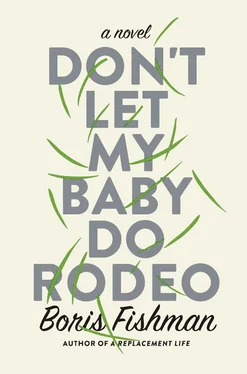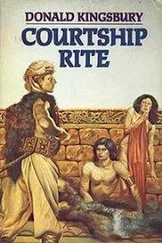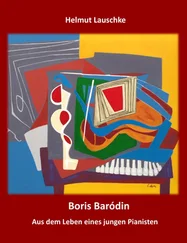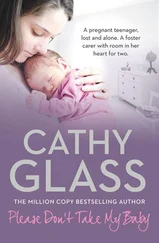But it wasn’t this ritual, strange though it was due to the cabalistic overtones of the odd, raw ingredients — for a moment, Maya tensed at the thought that Max had been cursed in a new way at Madam Stella’s — that held their attention. It was the fact that around Max milled a convention of bucks, does, and fawns, who always bolted as soon as Alex heaved open the yard door in fury. Maya counted, stricken: There were nine. They were chewing the twigs around Max’s feet. Though Max had yet to utilize the mixture he was preparing, the teeth of none were clamped around the pines. Occasionally, the visitors rubbed their white-spotted flanks against Max’s side, like housebroken cats. Except for the fawns, all were bigger than Max, and when they sidled past him, they bumped his small body so that it looked as if he might fall over.
Maya reached for the handle of the sliding door. But another hand — she was too startled to check whose, but it was an unfamiliar hand, and later she thought it must have been Bender — held her forearm. They watched Max bumped hard by a fat buck, stupidity in its eyes. It was the color of dead leaves save for two white circles around the eyes and a patch below its mouth; it looked like it was wearing a mask. Max put down the water bucket — which, perhaps out of sensitivity toward his father, he was trying to pour into the sprayer without spilling onto the lawn — and turned toward the buck, its antlers like two gnarled, splayed hands. Then he laid his palm on the velvet-looking spot between the antlers. They stood like that for a minute, the deer’s eyes shielded by Max’s palm. Finally, the buck tucked its hooves under the muscled flank of its belly and dropped to the ground.
Bender’s hands fell out of his pockets. Though he had solved the Kennedy curse, he had never witnessed anything comparable.
Maya felt — she felt rather than saw it — a body break from the group by the door. It broke forward, it heaved open the sliding door with a melancholy sigh, it lunged ahead only to discover the screen door blocking its way, it uttered a curse that had never been heard in the house, it ripped open the screen door, and burst onto the deck. Only then, from the back, did Maya see that her husband was rushing out after their child. She mouthed a weak no — mouthed it weakly and without any intention to be heard.
Seeing Alex, the buck with the masklike face sprang from its seat, an antler grazing Max on the side of his head. Max yelped and clutched his temple with both hands; the Rubins and Benders did not need perfect vision to see the blood spurting down his little fingers. Maya shrieked. The fawns and does became agitated and began to flee, trampling the ground. Max, down on one knee, went down on his butt, and then he was prostrate. As they stalked away, the animals trampled him. He tried to roll up like a snail to protect himself from the stampede.
+
Alex was shouting for her to get Max in the car. Max was sobbing in short, agitated bursts. Kissing him up and down his face, Maya managed to pry his hand from his temple. Alex barked Maya’s name again. The elder Rubins and the Benders stood fixed in place, terrified. After she wiped his temple with a damp cloth, Max wincing and wriggling and his sobs turning to squeals, Maya saw a puffy pink welt, but no broken skin. But where had the blood come from? She soaked a gauze pad in peroxide and then tied a strip of gauze around his head so it would remain in place. He looked like a war wounded. Max whined, too tight. “Shhh, my love, shhh,” she whispered into his ear, and allowed the two of them to be swept toward the car.
In the emergency room was the usual collection of young men with heads in their hands, blood on their T-shirts, and hastily wrapped bandages marking the injury, and mothers with whimpering children. It was the latter group that frightened Maya more — partly because it was mothers and children, and partly because you couldn’t tell what was wrong.
In the car, Maya had got Moira from the hospital — Moira was off on the weekends, but she had a friend in the emergency room. The Rubins were quietly seen as soon as they entered, though it was not apparent whom to thank. However, the doctor they were given looked no older than twenty and spoke wearily from behind owlish glasses. Maya wanted to insist on someone more alert, but settled on apprising him that she was an employee of the hospital, though this did not alter his manner. The blood was not Max’s. “It’s summer, they’re in velvet,” he said. “It’s soft tissue. One scratch, and it flows. You’re lucky. If it was fall, your son might have been really hurt. Disinfectant twice a day, and he’s going to be fine.” He squatted before Max, who wouldn’t let go of his father’s hand. “You got yourself a fright,” the doctor said to him. “Usually, someone’s walking out onto the deck, and they’ll startle a buck. Is that what happened?” Alex rushed to say yes before his wife had a chance to answer truthfully.
Maya spent the night next to Max in his bed. She didn’t sleep, though he did. She resisted her craving to check the wound. Because it was night — because the chorus of Rubins had quieted, because she was sleeping in a different bed with a different body beside her, because sometimes she did drift closer to sleep — several times she believed for more than a moment that it had all been imagined. The remainder of the time, she marked the slowness with which time passes when one is watching the clock. It was 2:17, and an hour later, it was 2:23. Was she responsible? Had the visit to Madam Stella hexed Max instead of unhexed him? But everything had been fine until Alex intervened. And yet, what had been fine — her son playing with deer? She didn’t know what to do because she didn’t know what to regard as the problem.
At six, she had the impression that the sun would not rise. It was not dread that she felt, more a general impression that incrementally — imperceptible in the passage of days — her life had tilted from its center, like a ship listing. This was the new level. After seeing her son surrounded by more deer than he had ever had friends, it was not difficult to imagine the sun no longer rising with the same regularity. When it did, at half past six, it did so rudely, all at once. A blast of gray light cut through the night, and then it was everywhere.
Belatedly, she heard the sounds of coffee downstairs. It was too early for Alex — he took advantage of being one of the principals at work by arriving at nine. Maya’s work started earlier, and Max was sometimes out the door for school before his father had woken. Maya eased herself out of Max’s grip and tiptoed downstairs. Alex was at the kitchen table — in a bathrobe and leather slippers, a cup of black coffee steaming in front of him. He drank it milky and sweet but there was no milk or sugar in front of him. He didn’t seem particularly interested in the coffee — he just fingered the handle and stared at the cup.
“You’re up,” she observed.
He nodded distractedly. She leaned against the doorjamb and crossed her arms.
“Sit at the table,” he offered.
Maya didn’t have the energy to pull out the chair and merely wedged herself into the thin space between its back and the table. She felt thin — scooped away. She had eaten badly in the previous weeks, and her body showed the change quickly. Until now, she had not noticed it, really. The only thing she was aware of was how unaware she felt. And this despite trying so hard to pay attention. Trying to notice every little thing.
There were papers in Alex’s hands. He was fingering the handle of the coffee cup only because his other hand was tracing the lines on the pages before him. One never saw papers in Alex’s hands. The paperwork was Maya’s domain. Alex handled the lawn, the fireplace, the doors when they needed oiling. Maya handled the bills and the coupons and Max’s permission slips and everyone’s medical records, and invitations from the local synagogue. There was a basket in the corner of the kitchen counter that said MAYA; all paper items requiring attention went there. But now Alex had papers in front of him. He was up an hour before his usual time, red-eyed and strange, with papers in front of him. All at once, she knew it was Max’s adoption paperwork. She knew it before she saw the agency’s logo on the stationery.
Читать дальше












